Chenaniah, a key figure in King David's era, masterfully led music in biblical times, showcasing the profound link between faith, art, and leadership.
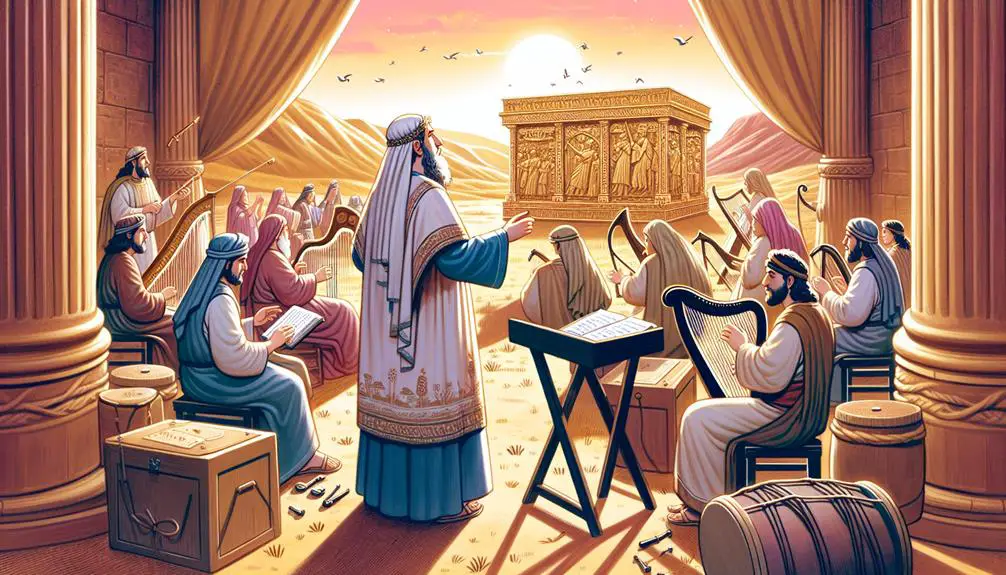
Chenaniah in the Bible
Did you know that in the vast tapestry of Biblical narratives, certain individuals, though mentioned briefly, have left an indelible mark on its cultural and spiritual legacy?
One such figure is Chenaniah, a name that surfaces with intriguing infrequency yet holds a pivotal role in the orchestration and leadership of music in the service of King David.
You might wonder why a character with relatively scant mention warrants attention. The answer lies in the unique blend of musical expertise and leadership qualities that Chenaniah exemplifies, offering valuable insights into the ancient world's appreciation of art and organization.
Uncovering the layers behind this enigmatic figure could provide a fresh perspective on the interconnectedness of faith, art, and leadership in biblical times.
Key Takeaways
- Chenaniah, a master of song and chief Levite, exemplified the significance of music in spiritual worship.
- His leadership blended humility with adaptability, influencing Levitical and worship practices.
- Chenaniah's expertise in musical instruments and arrangements highlighted the role of skill and innovation in worship.
- Through his life, Chenaniah teaches the importance of dedicated, heart-driven worship and multifaceted leadership in spiritual communities.
The Identity of Chenaniah
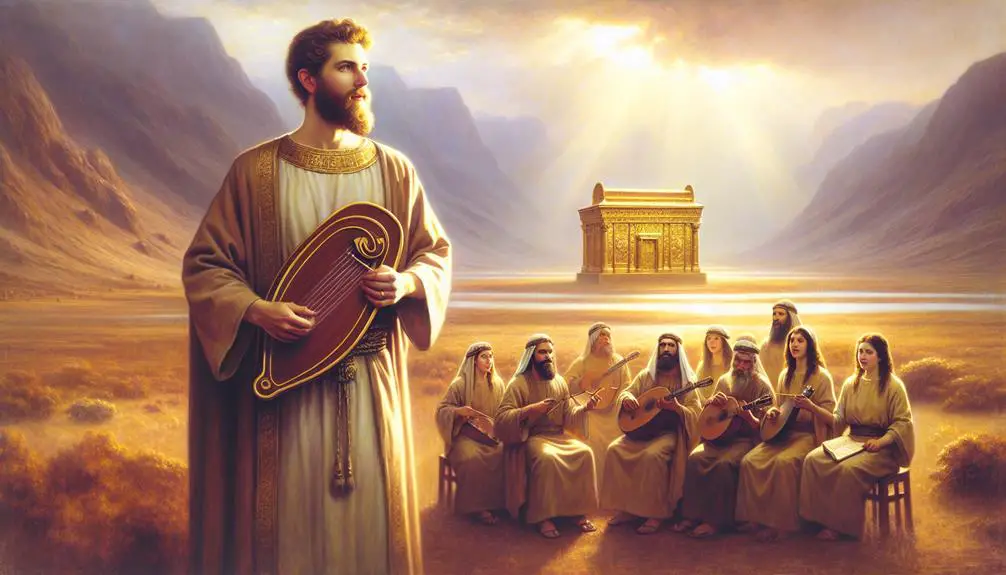
In biblical texts, Chenaniah is identified as a chief Levite and master of song, instrumental in overseeing the music during the transportation of the Ark of the Covenant. This figure, while central to a pivotal moment in Israelite worship practices, embodies a genealogical mystery that scholars and theologians have pondered over for centuries. The scant details provided about Chenaniah's lineage and background in the Scriptures spark curiosity and speculation, leading to various interpretations and theories regarding his place within the Levitical order.
The significance of Chenaniah's name further complicates the attempt to understand his identity fully. In Hebrew, the name Chenaniah means 'Yahweh has favored,' which could imply a special divine purpose or calling for this individual. This interpretation suggests that Chenaniah's role wasn't merely a familial or hereditary position but one of divine appointment, highlighting his importance in the orchestration of sacred rituals and ceremonies.
Moreover, the lack of detailed genealogical records concerning Chenaniah prompts a deeper investigation into the Levitical roles during his time. It raises questions about the criteria for leadership within the Levite community, especially concerning roles that required a high level of skill and spiritual discernment, such as the oversight of musical worship.
In essence, the identity of Chenaniah is shrouded in a genealogical mystery that underscores the complexity of Levitical service and the significance of names within the biblical narrative. His appointment as a master of song, despite the scant information about his origins, emphasizes the importance of divine favor and calling in the leadership and execution of Israelite worship practices.
Chenaniah's Musical Expertise
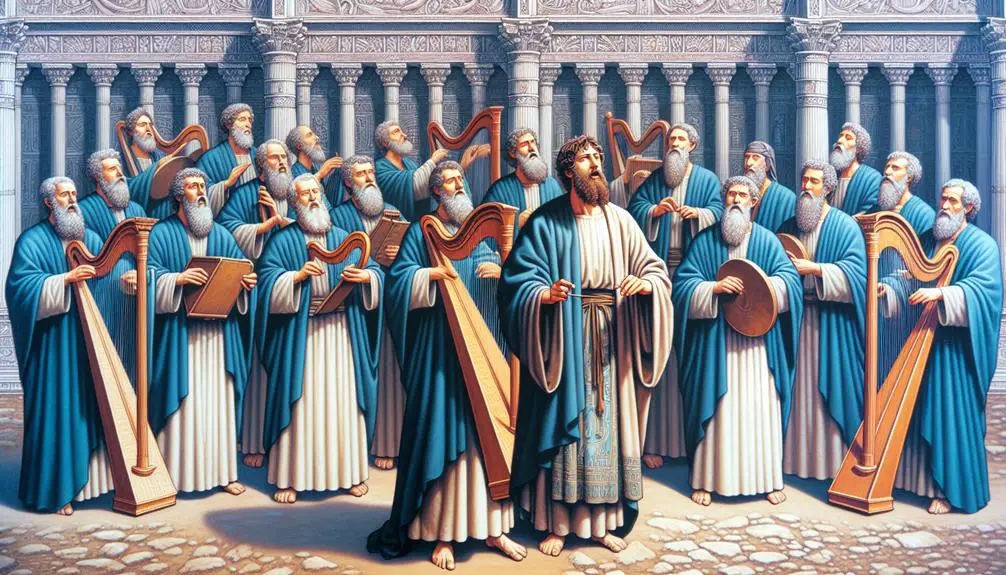
Exploring the enigmatic figure of Chenaniah further, his role as a chief Levite and master of song underscores his profound musical expertise, pivotal in the spiritual and cultural life of Israel. His adeptness spanned a wide array of instrument types and musical genres, suggesting a comprehensive understanding of both the technical and emotional aspects of music-making in ancient times.
You'll find that Chenaniah's expertise wasn't confined to mere vocal prowess; he was also likely proficient in instruments typical of the Levitical tradition, such as the lyre, harp, and cymbals. These instrument types weren't just tools for entertainment but were integral to worship and the conveyance of the sacred narratives of Israel. His role necessitated an encyclopedic knowledge of these instruments, each with its unique timbre and role in the ensemble, underscoring the complexity of his musical responsibilities.
Moreover, Chenaniah's command over various musical genres – from psalms and hymns to complex liturgical pieces – would have required an extraordinary ability to blend vocal and instrumental music in a manner that elevated the spiritual experience of his audience. This versatility not only highlights his technical skill but also his deep understanding of music's role in worship and communal identity.
In essence, Chenaniah's musical expertise was a testament to the richness of Levitical music tradition. His legacy, as a custodian of this tradition, underlines the indispensable role of music in the spiritual and cultural fabric of ancient Israel, serving as a bridge between the divine and the earthly realms.
Leadership Roles and Responsibilities
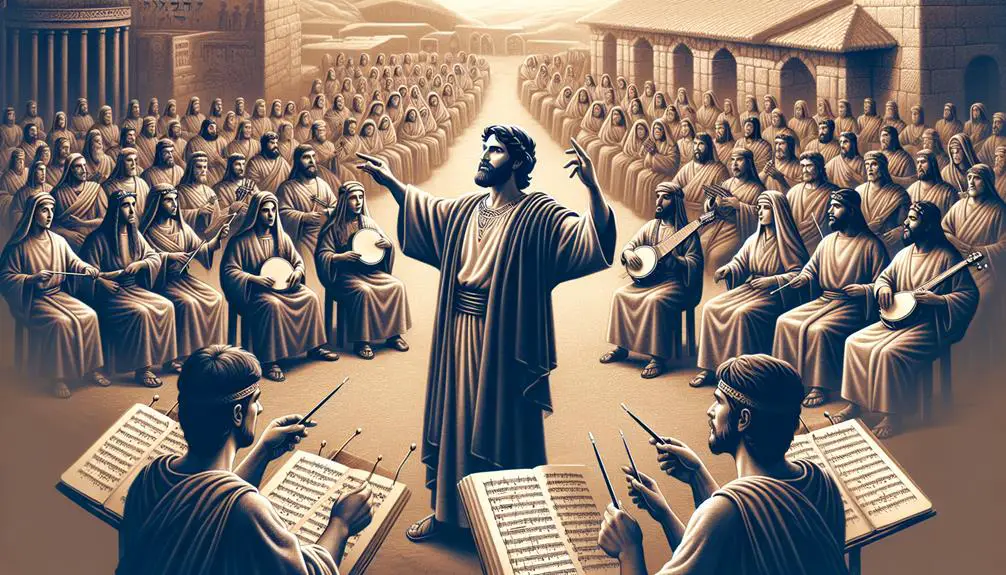
Chenaniah's leadership roles extended beyond his musical contributions, embodying the multifaceted responsibilities critical to guiding the Levitical community. His approach to leadership wasn't monolithic; it showcased a blend of styles that catered to the specific needs of his people and the sacred tasks at hand. This adaptability underscores the complexity of his role and the breadth of his capabilities.
Chenaniah's humility stood at the core of his leadership, serving as a guiding principle that informed his interactions and decisions. This trait wasn't merely a personal virtue but a strategic approach that fostered trust and respect among those he led. It's essential to note that humility in leadership didn't signify weakness or indecisiveness. Instead, it highlighted Chenaniah's strength in recognizing the value and contributions of others, thereby enhancing the collective effort.
In analyzing Chenaniah's leadership, three distinct styles emerge, each serving a specific function within the Levitical community:
- Directive Leadership: Taking charge during critical moments, especially in organizing and leading the music in worship.
- Participative Leadership: Engaging with his peers to foster a sense of community and shared purpose.
- Transformational Leadership: Inspiring change and a deeper commitment to their religious duties among the Levites.
Chenaniah's adeptness in navigating these styles, coupled with his humility, paints a picture of a leader deeply committed to his community's spiritual and communal well-being. His leadership transcended mere administration; it was a testament to the power of guiding with wisdom, adaptability, and a profound respect for the collective mission.
Chenaniah's Legacy in Worship
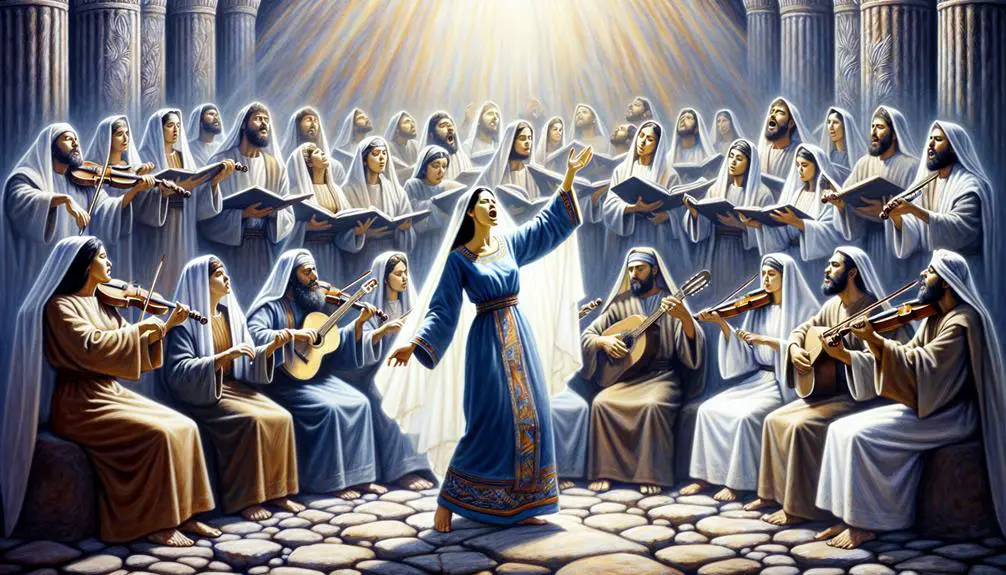
Building on his multifaceted leadership, Chenaniah's contributions to worship have left an indelible mark on the Levitical practices and rituals. His role wasn't merely administrative; it was deeply innovative, setting a precedent for worship that intertwined musical expertise with spiritual dedication. This duality of purpose underscored the importance of both skill and heart in the worship experience, a lesson that resonates through the ages.
Chenaniah's approach to worship wasn't just about fulfilling a duty; it was about elevating the act of worship through meticulous organization and a profound understanding of its spiritual significance. His leadership ensured that the worship was both a beautiful offering and a disciplined practice, reinforcing the idea that excellence in worship was a form of devotion. This blend of worship innovation and spiritual dedication under Chenaniah's guidance is captured in the following table:
Aspect of Worship |
Impact of Chenaniah's Leadership |
|---|---|
Musical Leadership |
Pioneered the integration of complex musical arrangements in worship, enhancing the emotional and spiritual engagement of the community. |
Organizational Structure |
Established a framework for the Levitical duties that balanced the spiritual and practical aspects of worship, ensuring its sustainability. |
Spiritual Orientation |
Emphasized the importance of purity, dedication, and skill in worship, setting a high standard for spiritual leaders. |
Chenaniah's legacy in worship is a testament to his visionary leadership. By marrying worship innovation with unwavering spiritual dedication, he crafted a model of worship that has endured, inspiring generations to approach worship with both skill and heart.
Lessons From Chenaniah's Life
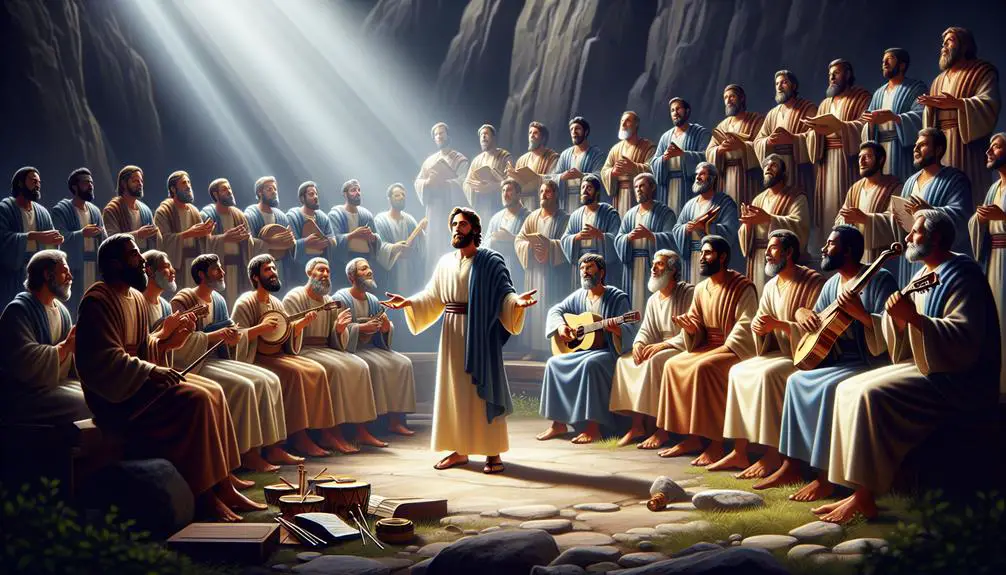
Delving into the life of Chenaniah offers invaluable insights into the fusion of skill and spirituality in leadership. His story, though briefly mentioned, encapsulates the essence of a divine appointment, meshed with unwavering personal dedication. Chenaniah wasn't merely a figure positioned by chance; his role was carved out through a clear understanding of his divine purpose and a relentless pursuit of excellence in his craft. This blend of spirituality and skill isn't just historical but a timeless principle that beckons your attention.
Key lessons from Chenaniah's life include:
- Divine appointment requires active participation: You're not just chosen; you're called to engage actively in the purpose laid out for you. Chenaniah's life exemplifies that divine selection is complemented by personal dedication and hard work.
- Skill and spirituality aren't mutually exclusive: Excel in your craft while nurturing your spiritual foundation. Chenaniah, a master in music and leadership, shows that proficiency in your field and spiritual depth can, and should, coexist.
- Leadership is multifaceted: Effective leadership transcends technical skill, embracing spiritual insight and emotional intelligence. Chenaniah's role as a leader in worship underscored the balance between expertise and spiritual sensitivity.
In dissecting Chenaniah's narrative, you're invited to reflect on your journey. Are you nurturing your divine appointment with personal dedication? Do you perceive your professional excellence as a separate entity from your spiritual growth? Chenaniah's life challenges these notions, urging a harmonious development of both spheres. His legacy, though encapsulated in a few verses, offers a profound blueprint for integrating skill with spirituality in your leadership journey.
Frequently Asked Questions
What Specific Biblical Texts Mention Chenaniah and How Do Scholars Interpret His Presence in Those Texts?**
You're diving into texts that mention Chenaniah, focusing on his lineage and the interpretive challenges his presence poses. Scholars scrutinize these references, analyzing how they contribute to our understanding of historical and theological contexts.
They debate the significance of his role and lineage, often encountering interpretive challenges due to the sparse details available. This analysis not only enriches our grasp of biblical narratives but also highlights the complexity of interpreting ancient texts.
How Does the Depiction of Chenaniah Contribute to Our Understanding of the Cultural and Religious Context of His Time?**
Without referring to a specific context, understanding characters like Chenaniah can unravel insights into cultural and religious landscapes. You'll see how musical notation and leadership styles of the time shape our comprehension.
Analyzing these elements sheds light on societal norms and religious practices. This approach not only enriches your understanding of historical contexts but also highlights the importance of music and leadership in shaping cultural and religious identities.
Are There Any Archaeological Findings or Historical Records Outside the Bible That Provide Additional Insights Into Chenaniah's Role or the Era He Lived In?**
You're diving into a quest for Chenaniah's lineage and era through non-Biblical lenses. Unfortunately, archaeological findings or historical records specifically spotlighting Chenaniah's role are scarce.
Modern interpretations rely heavily on scriptural accounts to infer his cultural significance. This lack challenges scholars to piece together his era's puzzle with limited direct evidence.
Your inquiry underscores the importance of interdisciplinary approaches to enhance understanding of ancient figures and their contexts.
How Has Chenaniah Been Represented in Religious Art, Literature, and Music Throughout History?**
You'll find Chenaniah's iconography and modern interpretations vary across religious art, literature, and music, reflecting his historical significance. While his depiction isn't as prevalent as other biblical figures, scholars analyze his representation to understand cultural shifts in perception.
Modern interpretations, especially in literature and music, often explore deeper theological themes associated with his story, showcasing how his legacy evolves with contemporary religious thought and artistic expression.
What Are the Parallels and Differences Between Chenaniah's Role and Responsibilities and Those of Other Biblical Figures Known for Their Musical Talents or Leadership?**
Diving into the realm of biblical characters, you'll find musician roles and leadership traits that resonate like strings on a harp.
While exploring these figures, it's clear that each played their part in a divine orchestra, yet with distinct tunes.
Unlike some who solely showcased musical prowess, others blended melody with guidance.
Analyzing these variances offers a symphony of insights, highlighting how leadership and music intertwine, each contributing unique notes to the biblical narrative.
Conclusion
As you reflect on Chenaniah's narrative, it becomes evident that his life serves as a mirror, reflecting the profound impact of dedication to one's craft and leadership in worship.
His musical expertise and leadership not only elevated the spiritual experience of his community but also set a benchmark for worship leaders.
Analyzing Chenaniah's legacy, it's clear that his contributions weren't just notes in a song but pivotal in orchestrating a deeper connection with the divine.
His story underscores the enduring power of committed and skilled leadership in worship.


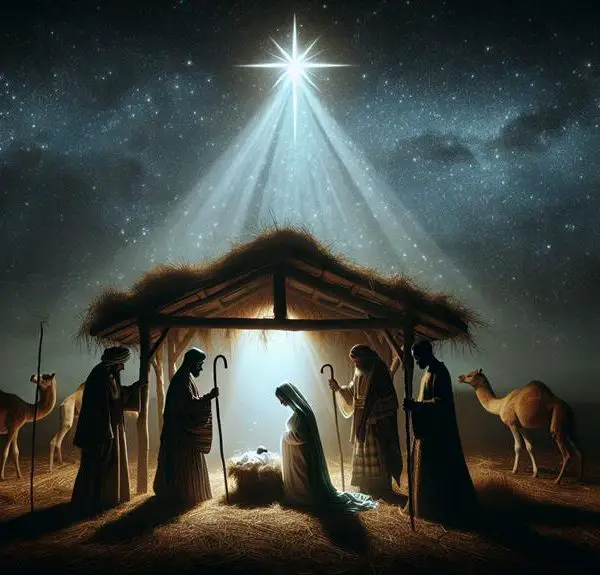
Sign up